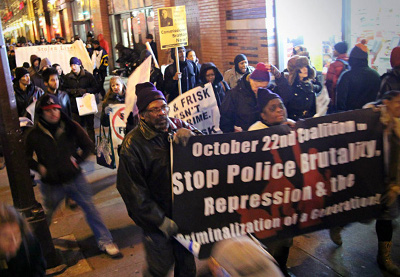Parents and Families Against Police Brutality Condemn Mayor-elect de Blasio’s Choice of New Police Commissioner, William Bratton
January 6, 2014 | Revolution Newspaper | revcom.us
New York City: The following statement was issued on December 15, 2013 (two weeks before de Blasio’s inauguration) by Parents and Families Against Police Brutality.
We are all outraged over Mayor-elect de Blasio’s choice of William Bratton for police commissioner and furious with Al Sharpton for allowing Bratton to speak at the National Action Network, knowing Bratton is not for the good of the Black community. At an inaugural press conference on October 3, 2002, newly appointed LAPD Chief William Bratton was quoted by the LA Times as saying:
Where you have guns, you have drugs. Where you have drugs, you have youth. Where you have youth, you have gangs. Why treat them like four different diseases? When you go to a doctor, he treats the totality of all that are affecting your body. L.A. is not doing that in any way, shape or form.
What can we expect from a cop who considers youth as a disease?

December 27, 2013. Over 75 people defied cold weather for a rally/speakout in Harlem and a march to the Bronx against the appointment of William Bratton as NYC Police Commissioner. Parents whose children have been murdered by the police spearheaded and gave the action its tone of anger and outrage. Photo: Jenna Pope
We can look to the bone-chilling reality of Bratton’s New York, when he was NYPD Commissioner between 1994 and 1996. Disturbing allegations of mistreatment, police brutality, deaths in custody and unjustified shootings became so serious during Bratton’s tenure that Amnesty International sent a team from London to investigate. Amnesty International found a “serious problem of police brutality and excessive force” in the NYPD under Bratton. The evidence suggested “that a large majority of the victims of police abuse are racial minorities, particularly African Americans and people of Latin American or Asian descent and that racial disparities appear to be most marked in cases involving deaths in custody and questionable shootings.”
Bratton dismissed the 72-page Amnesty International report as having no merit, despite the fact that Amnesty used the NYPD’s own statistics. Amnesty International found that in Bratton’s first year in office, there was a 34.8% increase in civilians shot dead by NYPD, a 53.3% increase in civilians who died in police custody, an upsurge in the number of civilians injured from officers’ firearm discharge, and 4,920 new police brutality complaints by citizens made to the city’s Civilian Complaint Review Board, an increase of 37% over the previous year (according to the New York Times, in 1995, 8,767 complaints were filed with the CCRB, and between July 1993 and December 1996, the CCRB handled 16,327 complaints).
And how about this one: as soon as Bratton was sworn in as NYPD Commissioner, all NYPD officers were issued a 15-round rapid-firing 9-millimeter semi-automatic handgun, replacing the 6-bullet .38 caliber revolvers that were formerly carried. Before this, even some NYPD Commissioners had resisted the use of semi-automatic weapons on the grounds that they would increase the likelihood of officers firing more rounds than necessary, or emptying their guns into people. Newsday described this as “one of the largest re-arming projects the country has ever seen.” In 1999, a few years after Bratton’s departure, the NYPD “Street Crime Unit” shot Guinean immigrant Amadou Diallo 41 times, thus realizing the worst fears many had about Bratton’s issuance of these high-powered weapons to thousands of NYPD cops.
From 1994 to 1996, New York saw an explosion in the number of people arrested. In 1994, 198,066 people were arrested. In 1995, 268,057 were arrested. The majority of arrests were for non-violent misdemeanors. Thousands were arrested for “illegal peddling,” 40,000 youth were picked up by police for truancy. Bratton’s “Streets Crime Unit” made 9,000 arrests in 45,000 stops in the two years under Bratton’s “Stop and Frisk” policy. 63% of those stopped in those two years were Black, and most of the others were Latino. Close to 90% of those “Stopped and Frisked” were people of color. In one case, the City of New York paid up to $50 million to settle a lawsuit on behalf of some 50,000 people who were illegally strip searched after being arrested for so-called “broken windows” offenses, the largest monetary settlement of a civil rights lawsuit in New York City history.
A police murder spree ensued during the two years on Bratton’s watch. Between January 1994 and August 1996, over 60 people died at the hands of NYPD. The book Stolen Lives: Killed By Law Enforcement, published by the October 22 Coalition to Stop Police Brutality Repression and the Criminalization of a Generation; the National Lawyers Guild and the Anthony Baez Foundation, has documented the horrifying reality of Bratton’s New York. Nicholas Heyward Jr.,13 years young; Anthony Baez, 29 years young; Shu’aib Abdul Latif, 17 years young; Anthony Rosario, 18 years young; Hilton Vega, 22 years young; Anibal Carasquillo, 21 years young; Yong Xin Huang, 16 years young, Frankie Arzuaga, 15 years young. The list of Stolen Lives under Bratton goes on.
Now tell us what gave the Rev. Al Sharpton the nerve to have this man whose history he knows well come to the National Action Network to speak in honor of Nelson Mandela. If the reverend cares as much about police brutality as he claims, he should be standing with parents of those murdered by police in voicing our concerns for all New Yorkers. We are extremely disturbed by Mayor-elect de Blasio’s appointing of Bratton as Police Commissioner of New York City.
If you like this article, subscribe, donate to and sustain Revolution newspaper.
